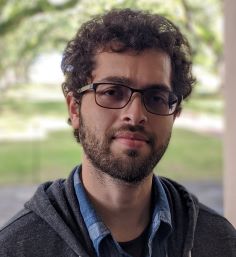Predoctoral Trainees
Rose Albert, MPH
Mentor: Krithika Lingappan, MD, PhD, MS
Rose graduated from the University of Alabama at Birmingham with a BS in Chemistry and an MPH in Environmental Health. For her undergraduate thesis, she utilized fluorescence polarization microscopy to establish a timeline for the acquisition of cadherin order during desmosome assembly. While in Alabama, her academic and nonprofit experiences in public health policy, environmental leadership, and social justice advocacy fostered a deep connection to southern environmental justice issues. Now as a Pharmacology PhD student in the lab of Dr. Krithika Lingappan, Rose studies environmental exposures and sex differences in lung injury and development. Rose’s long-term goal is to provide scientific and technical support to communities overburdened by environmental injustice and the climate crisis, especially in the South.
Andrea Andress Huacachino
Mentor: Trevor Penning, PhD
Andrea is a doctoral candidate in the Biochemistry and Molecular Biophysics graduate group. She completed her BS in Chemical Biology and MS in Chemistry from Stevens Institute of Technology. Andrea joined the lab of Dr. Trevor Penning where her research explores the environmental component of polycystic ovary syndrome, PCOS, by characterizing perfluorooctanoic acid, PFOA. She also wants to understand the role of hyperandrogenism in PCOS. Using cellular, biochemical, and computational methods, interactions between the aldo-keto reductase family 1 members (AKR1C), hyperandrogenism, and PFOA in the context of PCOS are explored. Her interest in the topic stems from its connection to toxicology, relevance to women’s health, and impact on social responsibility. Andrea is strongly passionate about environmental justice and involved in various diversity and inclusion initiatives around the Penn and Philadelphia community.
Ceire Hay
Mentor: Sarah E. Henrickson, MD, PhD
Ceire Hay is an Immunology doctoral candidate in the lab of Dr. Sarah Henrickson. Ceire earned her BS from West Chester University in May 2016. Following this, she joined the laboratory of Dr. Katelyn Byrne at the University of Pennsylvania where she studied mechanisms of CD8 T cell trafficking in the context of pancreatic ductal adenocarcinoma. In 2019, Ceire joined the Immunology Graduate Group and continued to explore her interests in T cell dysfunction under the mentorship of Dr. Henrickson. Ceire is interested in understanding the impact of obese asthma on both CD4 and CD8 T cell effector function. Using both human in vitro and mouse in vivo models, Ceire is employing a multimodal research approach that includes spectral flow cytometry, mass spectrometry, lipidomics and proteomics to better understand how adipose-secreted factors drive altered T cell function in children with obese asthma.
Postdoctoral Trainees
Patrick Gleeson, MD, MSCE
Mentor: Blanca Himes, PhD
Dr. Gleeson is an attending physician in the Section of Allergy and Immunology within the Division of Pulmonary, Allergy and Critical Care Medicine at Penn. He did his fellowship in Allergy and Immunology at Penn and then completed a Master of Science in Clinical Epidemiology (MSCE). His research focus is on improving allergy testing implementation in adults with asthma, and he is specifically interested in how allergy test results impact patient care and healthcare utilization.
Anna Palovcak, PhD
Mentor: Kara Bernstein, PhD
Anna is a postdoctoral researcher in the Bernstein lab in the department of Biochemistry and Biophysics. She earned her PhD at the University of Miami. Her research focuses on DNA repair mechanisms of genomic alkylation damage. The goal of the research is to determine the biochemical mechanisms used by DNA repair factors to successfully remove DNA alkylation damage and restore genome fidelity. These findings can then inform how individual genetic differences in certain DNA repair factors contribute to varying efficiencies in DNA alkylation damage repair, which can predict cancer development risk and treatment strategies.
Alekh Paranjapye, PhD
Mentor: Erica Korb, PhD
Alekh is a postdoctoral researcher who joined the Korb lab in the Genetics Department in 2022. There, he studies complex gene regulation in neurons. He earned his PhD in Genetics and Genome Sciences from Case Western Reserve University where he focused on epigenetics and higher order chromatin structure in the human airway epithelium. One of his research interests is in determining the intersection of neurological gene expression paradigms affected by chromatin modifiers that may act as risk factors of autism spectrum disorder (ASD) and exposure to the toxicant bisphenol A (BPA).
J. Dylan (van Kampen) Weissenkampen, PhD
Mentor: Maja Bucan, PhD
Dylan is a postdoctoral researcher in the Bucan lab in the Genetics department, where he studies autism spectrum disorder (ASD) risk factors. He joined the Bucan lab in January 2021, after obtaining his PhD in Neuroscience from the Pennsylvania State University where he conducted research into integrating multiple modalities to investigate smoking behaviors. In the Bucan lab, Dylan investigates the interplay between genetics and environmental factors on ASD risk and symptomology.











